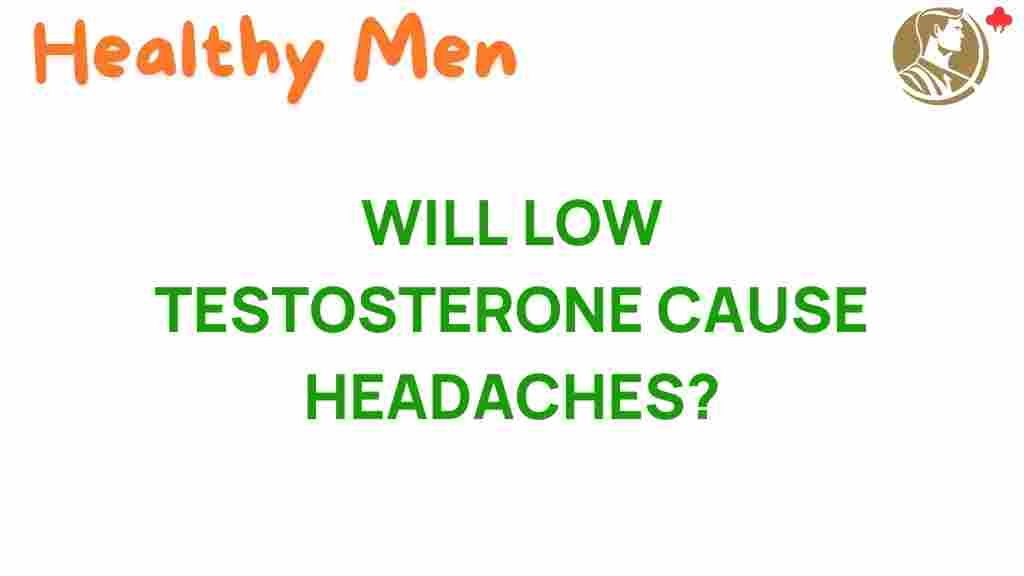Unraveling the Mystery: Can Low Testosterone Lead to Headaches?
Testosterone is a critical hormone in the male body, influencing numerous aspects of health, including muscle mass, bone density, mood, and energy levels. However, many men may not realize that low testosterone can also contribute to various health issues, including headaches. In this article, we will explore the connection between testosterone levels and headaches, delve into the health impacts of low testosterone, and provide insights into managing these symptoms.
Understanding Low Testosterone
Low testosterone, also known as hypogonadism, occurs when the body does not produce sufficient amounts of testosterone. This condition can develop due to various factors, including aging, certain medical conditions, and lifestyle choices. The symptoms of low testosterone can significantly affect men’s health and overall well-being.
Symptoms of Low Testosterone
Recognizing the symptoms of low testosterone is crucial for timely intervention. Common symptoms include:
- Fatigue and decreased energy levels
- Reduced libido and sexual dysfunction
- Increased body fat
- Loss of muscle mass
- Depression or mood changes
- Difficulty concentrating and memory issues
- Headaches or migraines
Among these symptoms, headaches can be particularly distressing, often leading individuals to seek medical advice.
The Link Between Low Testosterone and Headaches
Research indicates that fluctuations in hormone levels, particularly testosterone, can contribute to the onset of migraines and other types of headaches. While the exact mechanisms are not fully understood, several theories exist regarding how low testosterone may lead to headaches.
Hormonal Fluctuations and Headaches
Testosterone plays a role in regulating neurotransmitters and brain function. Low levels of testosterone can lead to:
- Increased Sensitivity: Changes in hormone levels can heighten sensitivity to pain, making headaches more likely.
- Vascular Changes: Testosterone may influence blood vessel function; low levels can lead to vascular dysfunction, potentially causing migraines.
- Mood Disorders: Low testosterone is linked to anxiety and depression, which can trigger tension headaches.
Understanding these connections can be crucial for men experiencing headaches alongside symptoms of low testosterone.
Medical Research on Low Testosterone and Headaches
Various studies have explored the relationship between testosterone levels and headache disorders. For instance, a study published in the journal Headache found that men with low testosterone levels reported higher instances of migraines compared to those with normal hormone levels. Another study in the Journal of Clinical Endocrinology & Metabolism noted that testosterone therapy resulted in a reduction in the frequency and severity of headaches in hypogonadal men.
These findings underscore the importance of considering hormonal health when evaluating headache disorders in men. If you suspect low testosterone might be contributing to your headaches, consult with a healthcare professional.
Step-by-Step Process: Assessing and Managing Low Testosterone and Headaches
If you’re experiencing headaches and suspect low testosterone, following a structured approach can help in assessment and management:
Step 1: Recognize Symptoms
Identify any symptoms of low testosterone alongside your headaches. Keep a journal of your symptoms, noting:
- Frequency and intensity of headaches
- Other symptoms like fatigue or mood changes
- Any potential triggers for your headaches
Step 2: Consult a Healthcare Professional
Book an appointment with your doctor to discuss your symptoms. Bring your symptom journal to help illustrate your concerns. Your doctor may recommend:
- Blood tests to measure testosterone levels
- Other hormonal assessments
- Evaluation of overall health and lifestyle factors
Step 3: Treatment Options
Depending on the results, your healthcare provider may suggest several treatment options:
- Testosterone Replacement Therapy (TRT): This can help restore testosterone levels and alleviate symptoms, including headaches.
- Lifestyle Changes: Diet, exercise, and stress management can positively impact hormone levels and overall health.
- Headache Management: Over-the-counter medications or prescribed treatments can help manage headache symptoms.
Step 4: Monitor Progress
After starting treatment, monitor your symptoms closely. It may take time to see improvements. Follow up with your doctor regularly to evaluate the effectiveness of the treatment plan.
Troubleshooting Tips for Managing Headaches Related to Low Testosterone
In addition to following a structured treatment plan, consider these troubleshooting tips to help manage headaches:
- Stay Hydrated: Dehydration can trigger headaches, so ensure you drink plenty of water throughout the day.
- Maintain a Balanced Diet: Include foods rich in omega-3 fatty acids, magnesium, and vitamins that support hormone health.
- Limit Trigger Foods: Identify and avoid foods that may trigger your headaches, such as processed foods, caffeine, and alcohol.
- Manage Stress: Practice relaxation techniques like meditation or yoga to reduce stress, which can contribute to headaches.
- Get Regular Exercise: Physical activity can improve hormone levels and reduce headache frequency.
Incorporating these strategies into your routine may enhance your wellness and alleviate headache symptoms.
Conclusion: Embracing Healthy Hormone Levels for Better Wellbeing
Understanding the relationship between low testosterone and headaches is vital for men experiencing these symptoms. Low testosterone can have significant health impacts, and recognizing its role in headaches is the first step toward finding relief. Through proper assessment, treatment, and lifestyle adjustments, men can improve their hormone levels and overall quality of life.
If you’re struggling with symptoms of low testosterone and headaches, don’t hesitate to reach out to a healthcare professional for guidance and support. Remember that taking proactive steps towards your health can lead to a more vibrant, headache-free life.
For more information on men’s health and wellness, check out our resources on health management. Additionally, you can find studies related to this topic in the journal Headache.
This article is in the category Conditions and created by healthymen Team
